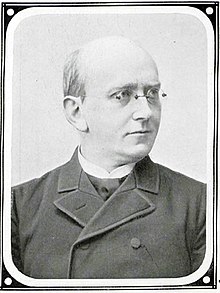Julius caftan
Julius Wilhelm Martin Kaftan (born September 30, 1848 in Loit near Aabenraa , North Schleswig, † August 27, 1926 in Berlin-Steglitz ) was a German Protestant theologian .
literature
Kaftan, a pastor's son, received his doctorate in Leipzig in 1872 and completed his habilitation there in 1873. In the following year he was first associate professor, in 1881 full professor at the University of Basel . Here he joined Albrecht Ritschl's theological school . In 1883 he took over the former chair of Friedrich Schleiermacher at the University of Berlin as the successor to Isaak August Dorner . There he officiated as rector in 1906/07.
In addition to his teaching and research activities, Kaftan was also active in church politics. In 1890 he was one of the founding members of the Evangelical Social Congress and was a member of the Friends of the Christian World for many years . From 1904 to 1925 he was a member of the Evangelical Upper Church Council of the Old Prussian Regional Church and since 1921 its spiritual vice-president.
He was a younger brother of the general superintendent for Schleswig, Theodor Kaftan , whose work he has significantly influenced.
Under the influence of Albrecht Ritschl, he determined faith and, in relation to it, the principle of writing as the principle of theology. In his writings, there is a strong reference to Immanuel Kant and Neo-Kantianism . He coined the thesis that "Kant was the philosopher of Protestantism ".
Fonts
A complete catalog of works can be found in: Walter Göbell (Ed.): Church, Law and Theology in Four Decades. The correspondence between the brothers Theodor and Julius Kaftan , Munich 1967, Vol. II, pp. 962–973.
- Essence of the Christian Religion , 1881.
- Truth of the Christian Religion , 1888.
- Philosophy of Protestantism , 1917.
- Christianity and Philosophy , 1896.
- Dogmatics , 1897.
- Justification by faith as a basic article of Protestant culture . 1901, Textarchiv - Internet Archive .
- Asceticism in the life of the evangelical Christian . 1904, Textarchiv - Internet Archive .
literature
- Walter Göbell : Kaftan, Julius. In: New German Biography (NDB). Volume 11, Duncker & Humblot, Berlin 1977, ISBN 3-428-00192-3 , p. 16 f. ( Digitized version ).
- Werner Raupp : Kaftan, Julius Wilhelm Martin. In: Biographisch-Bibliographisches Kirchenlexikon (BBKL). Volume 14, Bautz, Herzberg 1998, ISBN 3-88309-073-5 , Sp. 1128-1133. (with extensive bibliography).
- Markus Schröder: Kaftan, Julius . In: Religion Past and Present (RGG). 4th edition. Volume 4, Mohr-Siebeck, Tübingen 2001, Sp. 733.
- Christina Costanza: Practice in eternity. Julius Kaftan's eschatological theology and ethics (= research on systematic and ecumenical theology 124). Vandenhoeck & Ruprecht, Göttingen 2009 (also Diss. Theol. Göttingen 2008).
Web links
- Literature by and about Julius Kaftan in the catalog of the German National Library
Individual evidence
- ↑ Julius Kaftan: Christianity and Philosophy . JC Hinrichs, 1896, p. 22 .
| personal data | |
|---|---|
| SURNAME | Kaftan, Julius |
| ALTERNATIVE NAMES | Kaftan, Julius Wilhelm Martin (full name) |
| BRIEF DESCRIPTION | Protestant theologian |
| DATE OF BIRTH | September 30, 1848 |
| PLACE OF BIRTH | Loit near Aabenraa, North Schleswig |
| DATE OF DEATH | August 27, 1926 |
| Place of death | Berlin-Steglitz |

